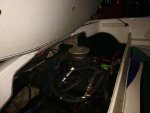Noes
Recruit
- Joined
- Mar 4, 2018
- Messages
- 4
Hi there
I just recently bought my first boat with a VP 4,3 V6 225 hp from 1998 in it. I found out that there was a bit of water in the oil, so i decided to pull the manifolds off to presure test them.
They are fine.
Then I presure tested the engine block, and it seems like that's the leaking part unfortunately.
Compression tested all 6 plugs, great compression.
So i now think the most likely part to have failed is a cylinderhead.
Assuming i have a cracked cylinderhead does anyone have any experience with block sealer like these, they seems very promising, though i have only heard of them used in cars.
http://www.irontite.com/store/index.php?main_page=product_info&cPath=1&products_id=142
No matter what i am gonna put a heatexchanger on the engine as i think that is the way to go from now on.
Using this would save loads of money and time for me, but can anyone tell me about experience with this stuff?
I just recently bought my first boat with a VP 4,3 V6 225 hp from 1998 in it. I found out that there was a bit of water in the oil, so i decided to pull the manifolds off to presure test them.
They are fine.
Then I presure tested the engine block, and it seems like that's the leaking part unfortunately.
Compression tested all 6 plugs, great compression.
So i now think the most likely part to have failed is a cylinderhead.
Assuming i have a cracked cylinderhead does anyone have any experience with block sealer like these, they seems very promising, though i have only heard of them used in cars.
http://www.irontite.com/store/index.php?main_page=product_info&cPath=1&products_id=142
No matter what i am gonna put a heatexchanger on the engine as i think that is the way to go from now on.
Using this would save loads of money and time for me, but can anyone tell me about experience with this stuff?




















